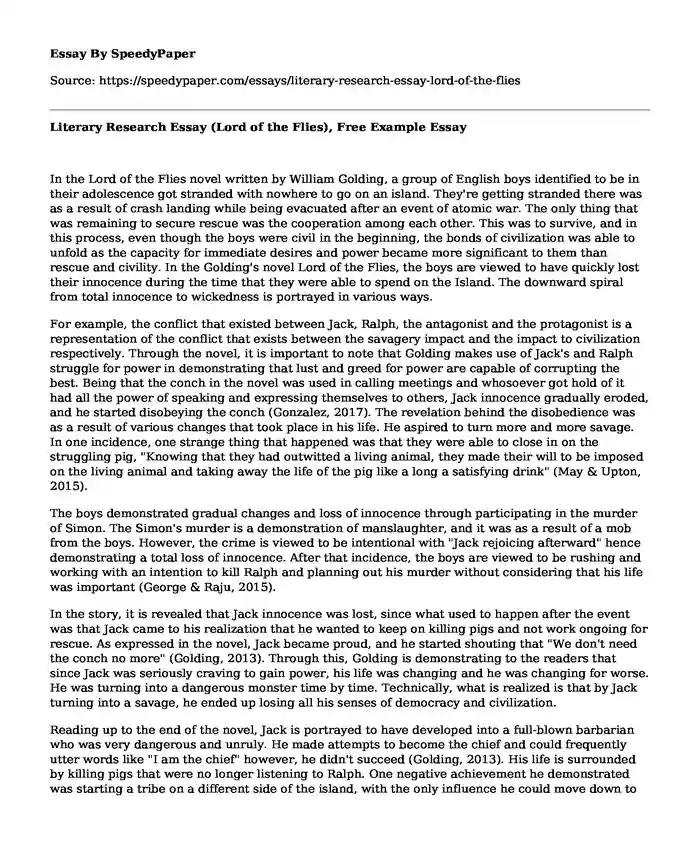
| Type of paper: | Essay |
| Categories: | English literature Lord of The Flies |
| Pages: | 3 |
| Wordcount: | 798 words |
In the Lord of the Flies novel written by William Golding, a group of English boys identified to be in their adolescence got stranded with nowhere to go on an island. They're getting stranded there was as a result of crash landing while being evacuated after an event of atomic war. The only thing that was remaining to secure rescue was the cooperation among each other. This was to survive, and in this process, even though the boys were civil in the beginning, the bonds of civilization was able to unfold as the capacity for immediate desires and power became more significant to them than rescue and civility. In the Golding's novel Lord of the Flies, the boys are viewed to have quickly lost their innocence during the time that they were able to spend on the Island. The downward spiral from total innocence to wickedness is portrayed in various ways.
For example, the conflict that existed between Jack, Ralph, the antagonist and the protagonist is a representation of the conflict that exists between the savagery impact and the impact to civilization respectively. Through the novel, it is important to note that Golding makes use of Jack's and Ralph struggle for power in demonstrating that lust and greed for power are capable of corrupting the best. Being that the conch in the novel was used in calling meetings and whosoever got hold of it had all the power of speaking and expressing themselves to others, Jack innocence gradually eroded, and he started disobeying the conch (Gonzalez, 2017). The revelation behind the disobedience was as a result of various changes that took place in his life. He aspired to turn more and more savage. In one incidence, one strange thing that happened was that they were able to close in on the struggling pig, "Knowing that they had outwitted a living animal, they made their will to be imposed on the living animal and taking away the life of the pig like a long a satisfying drink" (May & Upton, 2015).
The boys demonstrated gradual changes and loss of innocence through participating in the murder of Simon. The Simon's murder is a demonstration of manslaughter, and it was as a result of a mob from the boys. However, the crime is viewed to be intentional with "Jack rejoicing afterward" hence demonstrating a total loss of innocence. After that incidence, the boys are viewed to be rushing and working with an intention to kill Ralph and planning out his murder without considering that his life was important (George & Raju, 2015).
In the story, it is revealed that Jack innocence was lost, since what used to happen after the event was that Jack came to his realization that he wanted to keep on killing pigs and not work ongoing for rescue. As expressed in the novel, Jack became proud, and he started shouting that "We don't need the conch no more" (Golding, 2013). Through this, Golding is demonstrating to the readers that since Jack was seriously craving to gain power, his life was changing and he was changing for worse. He was turning into a dangerous monster time by time. Technically, what is realized is that by Jack turning into a savage, he ended up losing all his senses of democracy and civilization.
Reading up to the end of the novel, Jack is portrayed to have developed into a full-blown barbarian who was very dangerous and unruly. He made attempts to become the chief and could frequently utter words like "I am the chief" however, he didn't succeed (Golding, 2013). His life is surrounded by killing pigs that were no longer listening to Ralph. One negative achievement he demonstrated was starting a tribe on a different side of the island, with the only influence he could move down to others was hunting pigs. Additionally, one big surprise is that he could influence all the boys that followed him and all were transformed to great savage just like Jack.
Finally, the large number of death that took place on the island is a demonstration that the boys fall from innocence. With the boy with the birthmark dying first, we realized that he was being killed as a result of negligence, a crime that at a time is viewed to be horrible is the less a crime that is committed through passion.
Reference
George, J., & Raju, R. L. N. (2015). Personal Accountability to Evil in William Golding's Lord of the Flies. Mediterranean Journal of Social Sciences, 6(6 S2), 174.
Golding, W. (2013). Lord of the flies.
Gonzalez, L. F. (2017). LORD OF THE FLIES: THE INNATE EVIL OF MAN. Revista Folios, (13), 59-68.
May, K., & Upton, D. (2015). " Ser Piggy" Identifying an Intertextual Relationship between William Golding's Lord of the Flies and George RR Martin's A Game of Thrones. Extrapolation, 56(1), 63-81.
Cite this page
Literary Research Essay (Lord of the Flies), Free Example. (2022, Mar 02). Retrieved from https://speedypaper.net/essays/literary-research-essay-lord-of-the-flies
Request Removal
If you are the original author of this essay and no longer wish to have it published on the SpeedyPaper website, please click below to request its removal:
- Readmission Essay Example
- Free Essay on the Environmental Policy in the USA
- Creating Offerings on the Example of Diet Coke. Free Essay.
- Essay Sample on the Role of Israeli Jewish Women on Religion in Modern Times
- Free Essay Analyzing the Impact of Social Media on PUMA Company
- Free Essay on the Life of Early Homo Sapiens: Language, Hunting and Gathering, Paintings, Sculpture, and Music
- Creative Writing Essay Sample - The Missed Chapter of The Wars Book
Popular categories




